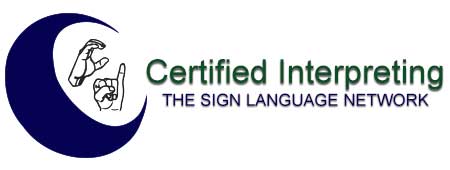The Americans with Disabilities Act (ADA) was enacted so that organizations, profit and non-profit, would make their services reasonably accessible to Deaf and Hard-of-Hearing persons, as well as to persons with disabilities in general. To view this law and how it may apply to you, see: ADA United States Department of Justice. Providing interpreters not only assures compliance with ADA accessibility laws, but also embraces the participation of Deaf persons in your events, whether they be staff, colleagues, clients, students, patients, or patrons.

FAQ
Am I required to provide an interpreter?
Are special skills needed in certain fields of interpreting?
Yes. Specialty fields such as Healthcare, Legal, and Classroom or Education interpreting each require training in those discipline areas. Various certifications are also becoming available in most specialty areas.
How can I be sure that interpreters will keep information confidential?
Interpreters are professionals and abide by Standards of Professional Conduct. Additionally, laws and statutes require adherence to rules of confidentiality, including privileged communication. See: Maine Revised Statutes. Interpreters in Healthcare settings often enter into Business Associate Agreements which add another level of compliance with HIPAA and requirements regarding Patient Health Information.
What is the difference between interpreting and translating?
Both interpreting and translating are similar in process: delivering the meaning and intent from one language and conveying it in another. However, the medium in which the language is expressed is different. Interpreting occurs between languages when they are spoken or signed. Whereas, translating occurs when one or both of the languages is written or otherwise in a frozen text form. Thus, when a live conversation is being interpreted, the spoken message is immediately interpreted into ASL, and conversely when the message is signed it is then interpreted into spoken English. When a letter, or other written document needs to be conveyed into ASL, it needs to be translated from its frozen text form. It could be translated into ASL in a live situation, or into recorded ASL on video. Typically, more time is available when translating as compared to interpreting, resulting in a more accurate and complete message.
What is the difference between simultaneous and consecutive interpreting?
In simultaneous interpreting, the interpreter attempts to keep pace with the speakers of both languages with a short amount of lag or processing time. Typically the speakers do not need to alter the natural pace of their speaking or signing. In consecutive interpreting, the interpreter waits for the speaker of either language to complete an idea or message portion before interpreting. This results in a more sequential turn-taking approach between the interpreter and the speaker. Research has shown that consecutive interpreting may result in a more accurate interpretation.
What information do I need to provide when making a request?
- Your contact information: name, phone number; and e-mail address
- The date(s) and time(s) services are needed
- The names of Deaf and Hearing consumers
- Complete description of the situation
- Location where services are to be provided and contact person at the assignment site
- Complete billing address for payment of services.
Why do interpreters charge for travel time?
Interpreters are visiting and itinerant professionals who will go wherever is needed to provide the requested services. Being such a large state, interpreters may travel long distances to various interpreting assignments. Having to travel from one location to another takes time and incurs expense. Thus, round-trip travel time (portal to portal) would be billed at the same rate as contact time.
Why are some cancelled assignments billable by interpreters?
Unfortunately, there are times when a requested assignment needs to be cancelled. This has a profound impact on itinerant interpreters who have exclusively reserved time for the assignment. Thus, cancellations with short notice would be billable depending on lead time of the cancellation, duration of the assignment, if any travel was incurred, and other factors. Such conditions would be discussed with you at the time of the request, and if a cancellation occurs.
Why are two or more interpreters required for certain assignments?
Interpreting can be mentally and physically taxing. Thus, assignments requiring more than one hour of continuous interpreting may necessitate a team of 2 or more interpreters. Other situations requiring an interpreting team include platform interpreting, settings with significant audience participation, or concurrent workshop sessions where multiple teams may be needed. Also, please see What is a “Deaf Interpreter?”
What is a “Deaf interpreter”?
There are times when a Deaf person included in an event requires or benefits from a level of linguistic and cultural bridging that is often not possible when a hearing ASL/English interpreter works alone. In such situations two interpreters, a hearing interpreter and a specialist interpreter who is Deaf, team up to assure clear and accurate communication. This would result in a more consecutive form of interpreting.
FMI, see: Deaf Interpreter
What is ASL?
See Learn ASL
How can I learn to interpret?
Prior to participating in any interpreter training, prospective interpreters need to develop fluency in both ASL and English. For further information on ASL acquisition, see Learn ASL. There are a number of interpreter training programs in Maine and New England. Locally, the interpreter training program at the University of Southern Maine (USM) is currently offering a variety of coursework in ASL and interpreter development.

